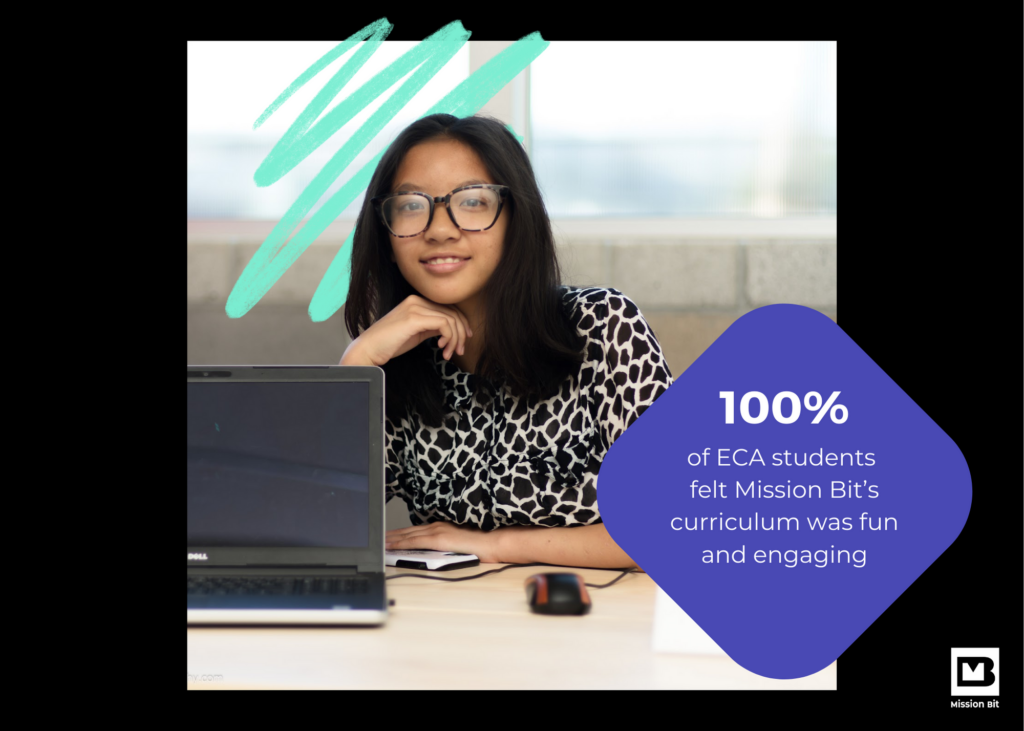Fostering a growth mindset in computer science education
By Rachel Scales

Mission Bit is on a mission to make programming accessible to underrepresented and under-resourced youth in the Bay Area. We foster a growth mindset in our classes to encourage students and lead them to success.
Growth mindset is a perspective that says that we can become better at a skill by practicing it. Instead of thinking that some people are just “good” or “bad” at certain things, a growth mindset teaches us that, with enough practice, we can learn any skill—even if it’s difficult!
For example, if you wanted to learn to play the piano, you might feel discouraged when you begin—playing the piano is hard, after all! You might think, “This is way too hard; I’ll never be good at this.” These thoughts represent a fixed mindset, the opposite of a growth mindset. You can reframe your thoughts into a growth mindset. Rather than saying, “This is way too hard,” you could say, “I can do hard things.” Instead of, “I’ll never be good at this,” you could say, “I’ll get better at this with practice!”
As an example in my own life, I’ve always wanted to learn how to skateboard. I tried it out as a teenager but got frustrated because I kept falling off the board. I decided I’d never be good at it and gave up. But that dream of coasting down the road on a skateboard never went away, so I picked the board back up as an adult. This time, I approached it with a growth mindset. Every time I fell off the board, I picked myself up and tried again. Eventually, I wasn’t falling anymore. Now, I’d say I’m pretty good at skateboarding! Practicing a growth mindset helped me learn this new skill that brings me so much joy.
Rejecting a fixed mindset
Growth mindset is vital to foster when learning to code. Coding can be a difficult skill to learn. There are lots of rules and jargon. It’s easy to feel frustrated, especially when comparing oneself to others. Some people promote a narrow view of learning to code. They say it’s something you’re either good at or not; if you find it difficult, it must mean you’re just not cut out for it. These sentiments demonstrate a fixed mindset. When internalized by learners, a fixed mindset can be supremely discouraging and demotivating.
At Mission Bit, we reject that viewpoint and instead embrace a growth mindset. In fact, after taking a class with us last fall, , 97% said the program was fun, and 98% said they’d recommend Mission Bit to a peer. Mission Bit sees tremendous effects from promoting a growth mindset in our programs.
The power of role models
A commitment to fostering a growth mindset begins with our instructors. In our classes, we encourage instructors to share their struggles in their coding journeys. It’s common to hear an instructor say, “I don’t know,” and then see them look up how to do something after a student asks a question. No one knows how to do everything, and not knowing is nothing to be ashamed of. Learning is a continuous journey; embracing a growth mindset helps us keep going on that journey.
Learning from mistakes
One of the key tenets of a growth mindset is learning from mistakes. In our coding classes, we put this into practice by giving students intentionally buggy code. Students work together to identify the issues and debug the code. The exercise reframes mistakes as something to learn from instead of something to avoid. Later, when students encounter real bugs in their code, they’ll feel less intimidated and more empowered to take them on. Growth mindset lets us see setbacks and challenges as opportunities for insight and progress.
Brainstorm together
Often, people focus on the end product. Does the program work as intended? Is it easy to use? Is it aesthetically pleasing? When we’re just starting out, it can be easy to look at a finished product and feel like we’ll never be able to make something that good. We don’t see all the time that went into brainstorming, drafting, prototyping, and revising. By incorporating brainstorming into lessons, such as through whiteboarding or group discussion, we show that the iterative process is as important as the finished product.
Reflect on how you’ve grown.
It can be easy to get caught up in feeling like there’s so much you don’t know; it’s easy for us to focus on how much we still don’t know how to do. This can make us feel overwhelmed and quite discouraged. Reflection activities can reinforce a growth mindset. You may ask students questions like, “What are two things you learned today?” or “What’s one question you have after today’s lesson?” Reflection activities can be incorporated even early on in a course. Meaningful reflection reinforces the message that we’re learning every day.
Grow with us
With a growth mindset at the heart of our work, Mission Bit promotes curiosity, resilience, and enthusiasm when learning to code.
Here at Mission Bit, we’re dedicated to the growth of our students. Help us keep our programming free for Bay Area youth! Donate today to make actionable change in your community.